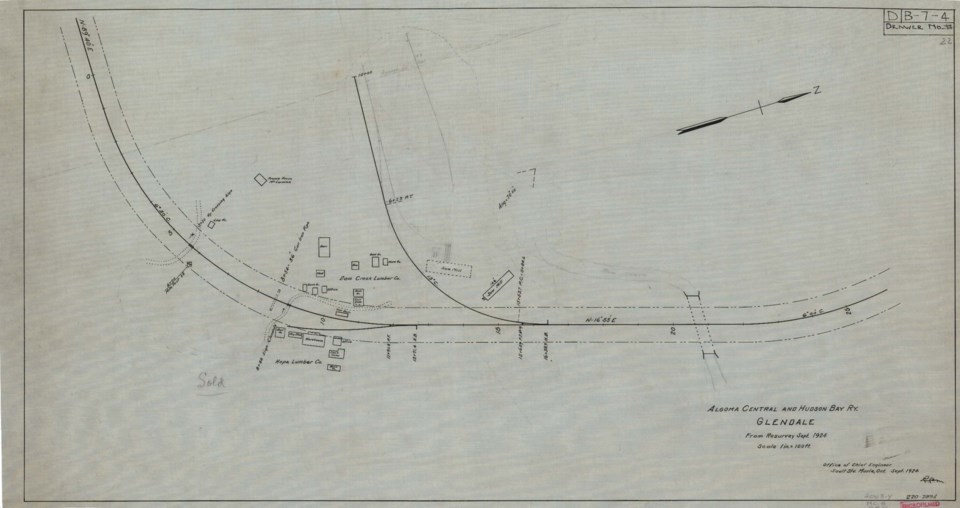From the archives of the Sault Ste. Marie Public Library:
In November of 1924, the Sault Daily Star broke a story of survival – one involving an employee of the newspaper.
Mr. I.J. Walters was working for the Sault Daily Star as a linotype operator, a person involved with typesetting the newspaper for printing. Walters was new to the area; he was originally from Toronto, where his wife and family still lived. And, on a Monday in November, he went missing north of the Sault.
When he hadn’t turned up by Wednesday, concerns mounted for his safety. Walters was hearing impaired and did not speak; he was out in a storm without proper supplies. The Star even arranged for police to search the area using an Ontario Forestry airplane.
However, just before the airplane was set to depart, word spread that Walters had turned up, alive, at an Island Lake cottage. He was somewhat the worse for wear – his clothing was shredded, and he was suffering from frostbite – but he had survived his ordeal.
The following day, the Star ran a story, in Walters’ own words, of what ensued.
On Monday, he set out in the Glendale area, near Searchmont, with “a compass, map and a police whistle, as [was his] custom when travelling in the bush.”
However, after following some deer tracks, he soon found himself in unfamiliar territory. Attempts to retrace his steps failed; it had started to rain at that point, and as the snow melted, so too did his footprints. That evening, after spending the day walking in hopes of reaching the ACR tracks, he stopped for the night.
He tried to rest under a tree, but a heavy thunderstorm rolled in. With it came a cold wind – made all the more treacherous by his wet clothing. He built a shelter out of pine boughs and slept there, keeping his rifle close to protect himself from wolves if need be.
Even with his hearing impairment, he heard wolves howling throughout the night. They came as close as 200 yards away from his shelter.
On Tuesday, still lost, he opted for more sturdy shelter. He cut out part of an already-hollow tree, making a space big enough for him to mostly fit inside. The (Toronto) Globe reported that he fired on a skunk to scare him out of the hollow tree, but this was not reported in Walters’ initial Sault Daily Star account.
Regardless of the original inhabitant of hollow tree, Walters took shelter there. His hands and head were still exposed, though, and he suffered through the bitterly cold wind.
While he whistled for help using his police whistle, there was no response. He didn’t see any airplanes overhead that he could try to flag down for help. And as he tried to find his way to safety, he continually had to backtrack and work around water and steep mountains.
As the cold set in, his progress slowed even more and he found it impossible to walk. He “was forced to crawl for miles, for [he] could not stand up. Every time [he] tried to stand, [he] fell forward on [his] face.”
He eventually forced himself upright and made slow progress, worried that if he crawled for much longer, he would lose circulation in his legs.
He had eaten the small meal he’d brought with him, and foraged for a “repast of ferns and dead wood” – food that he reported as being unpleasant “but better than nothing.” His matches were soaked through and he couldn’t start a fire to warm up and dry off.
On Wednesday, he got a clear view of his surroundings and guessed he was near Island Lake. He came up to a shack, which had smoke coming out of the chimney. He knocked – there was no response – and then went inside to find a man cooking in the kitchen.
As it turned out, the owners had decided to go hunting and stay at their camp as part of the expedition. They provided him food, loaned him clothing, then brought him across Island Lake by boat so that he could catch the train and return to Sault Ste. Marie.
Walters returned to work on Thursday, although he did report that his “feet and hands [were] still badly swollen.” He resolved that next time he went out into the woods, he would bring matches in a waterproof container and “[carry] a little bigger lunch.”
Each week, the Sault Ste. Marie Public Library and its Archives provides SooToday readers with a glimpse of the city’s past.
Find out more of what the Public Library has to offer at www.ssmpl.ca and look for more Remember This? columns here
